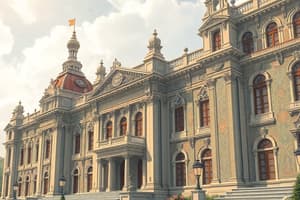Podcast
Questions and Answers
What does 'Consent of the Governed' refer to?
What does 'Consent of the Governed' refer to?
- A law passed by Parliament
- A type of government where citizens have no rights
- The requirement for legitimate government based on people's consent (correct)
- The declaration of independence
Who wrote the Declaration of Independence?
Who wrote the Declaration of Independence?
Thomas Jefferson
What is the significance of July 4, 1776?
What is the significance of July 4, 1776?
The day the United States declared independence.
George III was the King of Great Britain and Ireland.
George III was the King of Great Britain and Ireland.
Match the following terms related to government:
Match the following terms related to government:
What were the Intolerable Acts?
What were the Intolerable Acts?
What does Popular Sovereignty mean?
What does Popular Sovereignty mean?
Who was John Locke?
Who was John Locke?
The ______ Congress managed the Colonial war effort.
The ______ Congress managed the Colonial war effort.
What was the purpose of the Stamp Act?
What was the purpose of the Stamp Act?
What is a Republic?
What is a Republic?
What is the Declaration of the Rights of Man?
What is the Declaration of the Rights of Man?
Jean-Jacques Rousseau was known for his contributions as which of the following?
Jean-Jacques Rousseau was known for his contributions as which of the following?
The United States is a direct democracy.
The United States is a direct democracy.
Flashcards are hidden until you start studying
Study Notes
Consent Of The Governed
- Authority of a government must rely on the approval of the people.
- Consent typically expressed through electoral votes.
Declaration Of Independence
- Formal statement by Thomas Jefferson declaring U.S. freedom from British rule.
- Adopted by the Second Continental Congress on July 4, 1776.
Declaration Of The Rights Of Man
- Issued by France's National Constituent Assembly in August 1789.
- Essential document in the French Revolution, emphasizing human and civil rights.
George III
- Reigned as King of Great Britain and Ireland from October 25, 1760, to January 1, 1801.
- Continued as King of the United Kingdom of Great Britain and Ireland until his death in 1820.
Intolerable Acts
- Also known as the Coercive Acts; series of measures passed in 1774.
- Aimed to punish Massachusetts colonists following the Boston Tea Party.
John Locke
- Prominent political philosopher (1632-1704) known for his influential ideas.
- Advocated for natural rights, asserting that men are inherently free and equal.
July 4, 1776
- The day the United States declared independence from Great Britain.
Limited Government
- Concept emphasizing restricted governmental control over personal and economic affairs.
Natural Rights
- Rights considered inherent and inalienable, including life, liberty, and property.
- John Locke notably articulated these rights.
Parliament
- A legislative body in modern government, responsible for law-making and overseeing the government.
- Functions include representing the electorate and conducting inquiries.
Popular Sovereignty
- Principle that authority stems from the consent of the governed.
- The people, through elected representatives, hold the ultimate political power.
Representative Democracy
- Government system where officials are elected to represent the people.
- Differentiates from direct democracy, where decisions are made through majority vote.
Republic
- A state where supreme power resides with the people and their elected representatives.
- Typically led by an elected president instead of a monarch.
Rousseau
- 18th-century French philosopher, writer, and composer recognized for his influence on political theory.
Second Continental Congress
- Followed the First Continental Congress and managed colonial war efforts.
- Adopted the Declaration of Independence on July 4, 1776.
Shay's Rebellion
- Armed uprising led by Daniel Shays in western Massachusetts in 1786.
- Highlighted the issues of economic hardship and lack of governmental response.
Stamp Act
- Imposed in 1765 by the British Parliament to generate revenue from American colonies.
- Required a stamp duty on newspapers and legal/commercial documents.
Thomas Jefferson
- Principal author of the Declaration of Independence.
- Served as President of the United States from 1801 to 1809.
Two Treatises Of Government
- Work by John Locke, refuting the principles of royal authority espoused by Sir Robert Filmer.
Studying That Suits You
Use AI to generate personalized quizzes and flashcards to suit your learning preferences.




